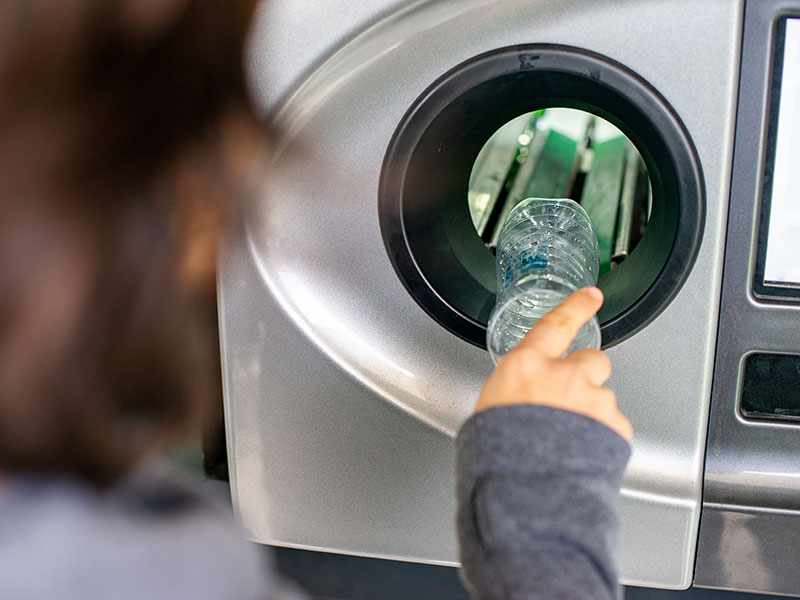Cyprus is getting in line with the rest of the European Union to reach its recycling goals after performing miserably in the past decades, with authorities introducing incentives for people to recycle their plastic waste.
Cypriots will be rewarded for taking their plastic waste to recycling points, where reverse vending machines will pay out cash for every item deposited.
The scheme is widely known as the Deposit Return Scheme and rewards users for returning their recyclables.
The island nation has failed on several of its environmental targets, including recycling and reducing its CO2 emissions in transport.
Cyprus recently failed to adopt an EU directive into law banning single-use plastic items, with the deadline expiring this month.
According to Green Dot, Cyprus is an underperformer in recycling plastic bottles, metal packaging and drink cartons as more often than not, these items are discarded into garbage receptacles.
Recyclable materials collected in 2020 dropped by 2,000 tonnes compared to 2019, from 29,560 tonnes to 27,319 tonnes.
On average, estimates say that just 10% of PMD waste is recycled.
“By investing in a deposit refund scheme and creating financial incentives for consumers to recycle, many cities around the world have seen significant increases in collection and recycling rates,” said Cyprus Green Party leader Charalampos Theopemptou.
The EU is raising the environmental bar for its member states.
“Cyprus was given the target to increase its recycling of PMD to 40%.”
Theopemptou said one of the ways the government is planning to boost recycling is to introduce deposit return schemes, which are systems where consumers are reimbursed when they bring a container to a collection point.
The container can then be recycled and transformed into secondary raw materials.
Theopemptou said a bill for introducing the DRS is currently before the parliament and is expected to be approved soon.
The Environment Department has launched a two-month consultation process with the public and interested parties.
According to the bill, for returning packages up to 3 litres, the return is 10 cents, while for water warranty packages made of PET plastic up to 0.5 litres, it is 5 cents.
The bill does not specify whether consumers will be paying an additional fee or a deposit on the actual products they purchase.
Packages will be stamped with a QR code that the machines will read to recognise the package type and return the amount due.
“At the moment, the scheme foresees that people returning packages will be given cash and run by the government, but it can be set up and managed by supermarkets or other agents.”
Deposit refund schemes are typically operated by a governmental entity or an independent body.
It is in charge of overseeing the scheme process from start to finish, from installing the necessary infrastructures to monitoring the deposit fee circuit that goes from producers to retailers and from retailers to consumers.
Plastic pollution
Marine Biologist and representative of the Friends of the Earth Cyprus, Natasa Ioannou, said that NGOs working for the environment are pleased as this is one of the issues on their lobbying campaigns.
“At least 8 million tonnes of plastic end up in our oceans every year and makeup 80% of all marine debris from surface waters to deep-sea sediments.
“In 2020, NGOs collected 942 kilos of plastic waste from our beaches during four clean-ups alone.”
Microplastics from items we use daily find their way to the sea, polluting the waters, poisoning sea life and the food chain.
Ioannou argued that handing out cash in return for PMD deposited is just one way the system could work.
“In other EU countries, DRS machines are placed outside supermarkets, public transport stations and give out discount vouchers for shopping or tickets.
“In Europe, 10 countries have already implemented deposit return schemes, with great success.”
Croatia, Denmark, Estonia, Finland, Germany, Iceland, Lithuania, Netherlands, Norway, and Sweden have achieved significant results.
The least successful country was Estonia, with an impressive 82.7% total return rate of cans, PET, and glass.
The most successful example in Europe is Norway, with an outstanding 97% recycling rate for plastic bottles.
The Friends of the Earth representative said giving incentives to people to recycle has proven to work.
“A few years back, DRS reverse vending machines were installed in coastal areas, giving out discount coupons for umbrellas and sunbeds at designated public beaches.
“They were a success; unfortunately, though, due to technical issues, they were withdrawn.”
Ioannou said that ecological NGOs are waiting for authorities to push forward with plans to implement a “pay as you throw” tax scheme on waste, to meet its EU environmental targets by further encouraging recycling.
Currently, the scheme is up and running with spectacular results in the Municipality of Aglantzia in Nicosia.
According to a municipal source, in the two months of implementation of the programme, there was 99.3% participation and a reduction of garbage at the Koshi waste disposal ground by 39% (561 tonnes).
However, other municipalities seem reluctant to follow in Aglantzia’s footsteps.
Larnaca Mayor and head of the Union of Municipalities, Andreas Vyras, told the Financial Mirror that while municipalities support rewarding citizens who recycle and ‘punish’ those who produce waste, local authorities are not ready to collect and manage recyclables.
Ioannou argued that implementing schemes such as DRS and the ‘pay as you throw’ is part of Cyprus’ environmental obligations towards the EU.
“Cyprus has the technology and the know-how to implement these small but effective ways to bring down the amount of waste that finds its way to the island’s landfills instead of being recycled.
“All we need is the will to implement them universally across the island.”










